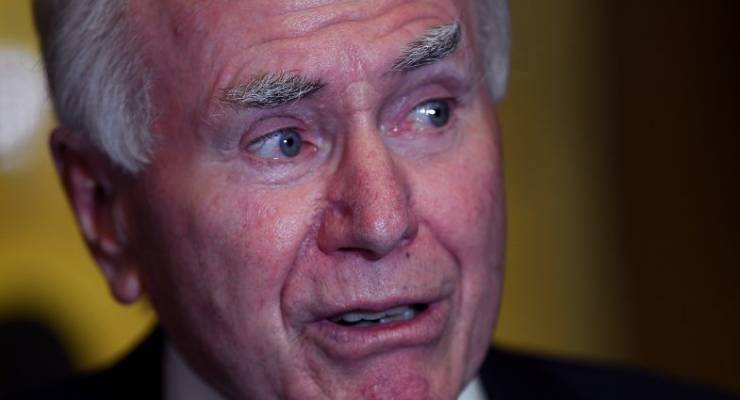
Last night, Scott Morrison arrived at Sydney’s Wentworth Hotel to claim victory as the Coalition stood poised either to claim a bare parliamentary majority, or to hold on as a minority government.
Three years earlier, his predecessor, Malcolm Turnbull, did exactly the same thing.
But whereas a jubilant Morrison was greeted by the party faithful as a conquering hero, Turnbull looked a diminished figure, a fact reflected in his perceptibly sour mood.
It is true the Coalition lost a good many seats in 2016, whereas most Coalition MPs who had a job on Friday continue to do so today — not counting the substantial number who were not re-contesting their seats, in many cases because they had written off the government’s chances of being returned.
Mostly though the marked difference in mood points to the importance of expectations — in this case between those surrounding Turnbull, the man of destiny feted for the prime ministership from a young age, and Morrison, who unexpectedly came to the leadership of a crippled government that had just advertised its instability in the most damaging fashion imaginable.
The expectations game was heavily influenced by opinion polls, which correctly pointed to a close result in 2016, but this time proved badly askew.
Some telling statistics can be invoked on this score, such as the fact that the last 11 polls of the campaign produced near-identical results around 51.5-48.5 in favour of Labor (the statistical unlikelihood of which was explored here last week), or the still more remarkable fact that not a single major polling series credited the Coalition with a two-party lead in any of the nearly 200 results published through the entirety of the parliamentary term.
After all that, the Coalition appears headed for a national two-party vote of maybe 51% — which was, once again, hardly different from 2016.
However, this was far from a status quo result, instead consisting of substantial electoral realignments that cancelled out in aggregate.
The consistent theme in this respect was the politics of climate change, which drove swings against the Coalition in blue-ribbon Liberal seats in Sydney and Melbourne.
This was a decisive factor in Tony Abbott’s heavy defeat at the hands of independent Zali Steggall in Warringah, but it amounted to punching into thin air as far as Labor was concerned, as the existing Liberal margins were far too big to overcome.
Mining cost Labor
However, anywhere mining or resources extraction were a factor, Labor got hammered.
Central Queensland was particularly striking on this score, recording swings at or near double digits in the neighbouring seats of Capricornia (based round Rockhampton, and not so long ago a fairly reliable seat for Labor), Dawson (where you might think George Christensen had given people something to vote against) and Herbert (where Labor member Cathy O’Toole’s 37 vote margin was obliterated by an 8.6% swing).
Similarly, a double-digit swing was recorded against Joel Fitzgibbon in the New South Wales coal mining seat of Hunter, where One Nation polled an extraordinary 21.4% — the best result in the entire country for a party that typically does its best trade in Queensland.
Howard’s battlers?
Unexpected as all this was, the underlying dynamic is not new, and should be especially familiar to those whose memories extend to Mark Latham’s defeat at the hands of John Howard in 2004.
Then as now, the northern Tasmanian seats of Bass and Braddon flipped from Labor to Liberal, with forestry policy providing the catalyst on that occasion, and Labor performed poorly in the outer suburbs, reflected in yesterday’s defeat in Lindsay and its failure to win crucial seats on the fringes of the four largest cities.
There were also swings to Labor against the trend in wealthy city seats, attributed in 2004 to the non-economic issues of the Iraq war and asylum seekers, and touted at the time as the “doctors’ wives” effect.
The unhelpfully sexist terminology has happily fallen from use, but it describes a phenomenon that is assuming ever greater importance here and abroad — notably in the American mid-terms in November, when wealthy suburbs turned against the Republicans.
Little good did it do Labor though, either in 2004 or last night, when the outer suburbs and regional cities again revealed themselves as the decisive constituencies in Australia’s electoral politics.








Crikey is committed to hosting lively discussions. Help us keep the conversation useful, interesting and welcoming. We aim to publish comments quickly in the interest of promoting robust conversation, but we’re a small team and we deploy filters to protect against legal risk. Occasionally your comment may be held up while we review, but we’re working as fast as we can to keep the conversation rolling.
The Crikey comment section is members-only content. Please subscribe to leave a comment.
The Crikey comment section is members-only content. Please login to leave a comment.